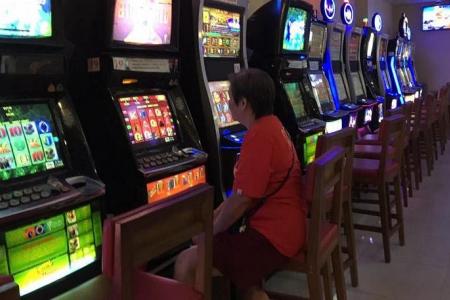Local clubs told to cease jackpot operations by end of October
Singapore Premier League (SPL) clubs have been told to shutter jackpot operations by the end of October.
Clubs were informed on Sept 15 of the move, which comes as the SPL heads towards privatisation, which will take place in 2023.
The Straits Times understands that from next season onwards, the SPL will come under the purview of the Unleash the Roar! (UTR) project, which was launched in 2021 and aims to get Singapore to the 2034 World Cup.
It is understood an official announcement will be made in due course.
Jackpot takings have been the main revenue stream for many football clubs over the last two decades, with some clubs running operations from as far back as 1996, when the local professional league was first formed.
Out of the eight current SPL clubs, five run jackpot operations.
The only sides that do not are developmental side Young Lions, the Lion City Sailors, who at the start of 2020 became Singapore's first privatised football club and Tanjong Pagar United. Tanjong Pagar rejoined the SPL only in 2020 after sitting out five seasons, and their jackpot licence was not renewed a year prior to that.
Clubs upset over late notice
The change - specifically the sudden nature with a final decision only passed six weeks before operations are required to cease - has upset a number of club officials.
One club had invested a "six-figure sum" to upgrade and automate its jackpot operations system earlier this year.
Another club even hired staff on Sept 1 to manage jackpot operations, only to learn two weeks later they would no longer be required.
Some clubs also have leases on rental spaces for their clubhouses which extend beyond 2022. These will now have to be broken, with clubs understood to be expected to foot the cost themselves.
It is understood clubs have been instructed to share their projected football expenses for November and December, and if their reserves from jackpot takings do not cover these expenses, then the FAS will provide recompense.
Subsidies to be increased
With jackpot earnings no longer a viable revenue stream for clubs from 2023, sources say the Unleash The Roar committee have plans to increase subsidies - there is a suggestion of an 80-100 per cent increase in the current annual $800,000 amount - for clubs for the next five years at least.
This increased funding aims to raise standards and the profile of the local league, to make it more attractive to potential investors in the long run.
Club officials contacted were not keen to speak on the jackpot closures, citing sensitivities over the issue.
One, who agreed to speak on condition of anonymity, said: "They told us this was something that was five years in the making. But we heard nothing since then, only for this to happen and then we have to close everything in six weeks.
"We are in a position where we cannot say anything. We just have to do it."
Another, who also asked not to be named, said he was frustrated by "mixed messaging" to club chairmen on the issue of jackpot operations.
Writing has been on the wall since 2017
The latest development follows a previous move by the Ministry of Home Affairs to tighten regulations around jackpot operations of local clubs after police raids of clubhouses in 2017 rocked the local football scene.
In the lead-up to the FAS elections held that year, the clubhouses of Hougang United, Woodlands Wellington and Tiong Bahru FC - the former was sitting out the local professional league while the latter is an amateur side - were raided by police. It was later revealed that TBFC had pulled in an eye-catching $36.8 million in 2016.
Less than a year after the FAS elections, TBFC, Woodlands and Sinchi were ordered to cease their jackpot operations, while other clubs were instructed to reduce their machines to a maximum of 15, by the end of 2019.
Currently, Hougang, Geylang International and Albirex Niigata own the maximum number of machines. Tampines Rovers have 13, while Balestier Khalsa have eight.
Clubs with the maximum number are understood to enjoy takings of nearly $500,000 annually, while Balestier are able to generate up to nearly $200,000 from their machines. This does not include expenses such as rent and wages, that differ from club to club.
SPL clubs operate on a budget of about $1.2 million and $1.5 million, with about $800,000 of that coming in the form of Tote Board subsidies, a portion of which is tied to key performance indicators.
Get The New Paper on your phone with the free TNP app. Download from the Apple App Store or Google Play Store now


